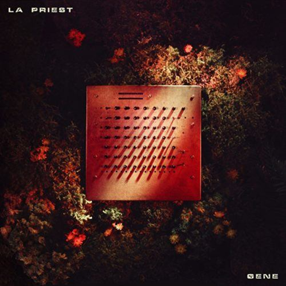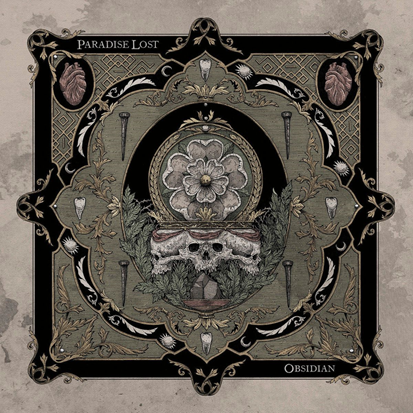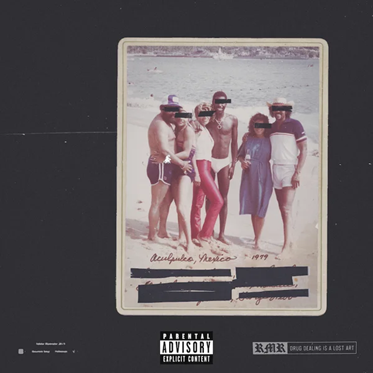We’re here to tell you what’s hot and what’s not in this week’s music roundup

LA Priest – GENE
Genre: Indietronica
Favorite Tracks: “Rubber Sky,” “Open My Eyes,” “What Do You See,” “Kissing Of The Weeds”
A lot has changed since LA Priest rose to psych rock prominence in 2015. Indie fans met Sam Eastgate’s alias at a time when tye-dye was making a rather unfortunate comeback and Mild High Club was the coolest band on the internet. While LA Priest’s debut album INJI was good enough to get sampled by Aminé and land Eastgate a collaborative project with treble-core icon Connan Mockasin, his debut record and the success that followed were still marked with art school pastiche and an inescapable fog of 35mm trendiness. Now, half a decade after “Learning To Love” and “Oino” soundtracked a generation of backyard kickbacks past, LA Priest is back with his sophomore switch up GENE. Even before I had heard any outtakes from Eastgate’s latest, I could tell I wasn’t in for more of the same velvet and crystal balls schtick that made his early work so simultaneously lovable and disposable. While GENE doesn’t fully abandon the late night ultra-aestheticism of his original material, the cover this time is more reminiscent of a Late Night Tales compilation than a Levitation Room single, the artwork featuring a photo of the Gene itself, a custom drum machine built for the album. Eastgate clearly no longer wants to be the type of LA priest you see sporting a shag in 2020 at Davey Wayne’s, he wants to be the type of LA synth nerd you see artfully noodling at Leaving Records’ events at Tierra De La Culebra park.
The first half of GENE isn’t as different from LA Priest’s prior releases as I’d initially hoped it would be; Paul Simon-esque globetrotting melodies give way to shapeshifting vocal harmonies on the track “Rubber Sky,” and “What Moves” dons a guitar line that sounds like Ariel Pink covering CAN’s “I Want More,” ultimately distracting with a fleeting, funky white dude hook. The first four tracks on GENE basically just sound like lost demos from Unknown Mortal Orchestra’s MULTI LOVE sessions, and even though the production is impressive, it doesn’t quite pack the same teeth-grinding star power that made INJI such a staple within its niche. However, after “Open My Eyes” brings in a delicate groove produced by Eastgate’s musical invention, things start to turn around. The aforementioned track pairs non-cheesy Tame Impala guitar chords with the same Pynchonesque culty lyrics that made Soft Hair such a fun project to drive around the suburbs cosplaying INHERENT VICE to. “What Do You See” mixes goofy Moog noodling and lovably quirky Auto-Tune vocal manipulation to create an ambience that sounds like El Guincho remixing “Diplomat’s Son” by Vampire Weekend. The Berlin synthscapes of “Black Smoke” and album highlight “Kissing of the Weeds” are each genre-bending 2020 standouts that somehow merge the trippiness of Animal Collective and the digitized emotion of How To Dress Well. If it weren’t for the record’s first fistful of tracks, GENE would actually be one of the most surprising comebacks in recent memory, but ultimately the record’s slow start leaves me wishing Eastgate had decided to prioritize quality over quantity. Regardless, GENE is a surprising record that shows potential and growth I would not have expected from LA Priest four years after his collaboration with Connan Mockasin solidified his place as a fixture in the second wave hippie revival fad of the mid 2010s. [Ted Davis]

Paradise Lost – OBSIDIAN
Genre: Gothic Metal
Favorite Tracks: “Ghosts,” “Serenity,” “Ending Days”
You don’t make 16 albums without a few duds, and the band whose 1991 record GOTHIC is credited with introducing the term “gothic metal” are no exception. Paradise Lost’s career highlights are as striking and pertinent to their genre as their lowlights are fascinating: the cheesy keyboard melodies of ONE SECOND that predate the similarly clean melodic goth of HIM, the synth-pop pastiche of HOST, the early aughts alt-metal of oily vocal filters and whooshing melodies that come off like they were too embarrassed to include real turntables on BELIEVE IN NOTHING. Unlike those records, OBSIDIAN does not initially appear like a change of direction, but I’d argue it’s their first in awhile that cannot be classified as doom metal. Perhaps Paradise Lost figured that 2017’s MEDUSA was their heaviest and best record in about 20 years, so they chose to focus on cleaner vocals and orchestral elements like violins, pianos, and choir vocals. The result is sadly reminiscent of their most tired records (notably 2005’s self-titled release), which aren’t even fascinatingly bad so much as they are emblematic of the most tedious aspects of the genre that Paradise Lost helped pioneer.
Paradise Lost’s guitar work alternates between crushing, downtuned chugging and reverby fingerpicking, but it is at its best when the rhythm and lead work play off one another: anguished, emotive leads against quaking power chords. That formula was part of what made MEDUSA so special, and yet the same does not happen on OBSIDIAN. There are solid solos on “Fall From Grace,” the mid-way point of “Serenity,” and a couple others, but the lead work is not memorable, the doomy progressions are rickety and sluggish without the power to compensate, and there isn’t a moment of visceral speed aside from the faded buzzing drive of “Ghosts” that deserved more muscle. Orchestral elements are also nothing new to Paradise Lost; my favorite song, “Dying Freedom” from ICON, opens with funereal keyboards, but it feels blended into the overall atmosphere. The piano on “The Devil Embraced,” the angelic choir of “Forsaken,” and especially the opening of “Ravenghast” feel like plug-ins rather than natural motifs that build and evolve with the rest of the songs like the best of Within Temptation, and they aren’t melodically intricate or hooky like Tribulation. Even the vocals, clean or growled, are unimpressive, especially in more melodic moments, and end up resembling Dommin or a Paradise Lost cover band rather than the original article. OBSIDIAN is a compromise that is meant to please fans of every era of Paradise Lost, from the doomy early records or the later reverby alt-metal, resulting in a product that offends and pleases no one. [Blake Michelle]

RMR – DRUG DEALING IS A LOST ART
Genre: Trap
Favorite Track: “RASCAL”
Nothing would bring me more joy in the year 2020 than to come here and praise a mask-wearing, mysterious black country singer with the voice of a Greek god, gracing us dumb-dumbs with his obvious talent. But instead I come bearing bad news: DRUG DEALING IS A LOST ART is a total miss. RMR has a lot of things going for him as an artist—that angelic voice and smooth flow, to be sure—and with better direction this EP would have been something worthy of those abilities. But instead the entire project just sounds like a bunch of feelers being sent aimlessly into the universe, seeing what connects.
The release of both “RASCAL” and its accompanying video helped RMR go viral, and the follow up, “DEALER,” was a nice change of pace that made a lot of people (including myself) hear what he could be capable of on a more fully fleshed-out project. But everything after those releases has been a direct desire to turn him into an overproduced Gen Z Nelly by way of OneRepublic—a version of an artist that absolutely no one was searching for, one that you couldn’t even dream up in the wildest of scenarios. There are absolutely no risks taken at all besides “RASCAL.” Songs like “I’M NOT OVER YOU” are devoid of any true artistic integrity, a recycled Timbaland beat with some of the most lifeless and vanilla lyrics to come out in 2020. It’s a confounding miss, and RMR even came out himself and tried to explain that it is a song about drug addiction, but absolutely none of that is visible on the canvas unless you’re explicitly told about it—even then it doesn’t feel there. A song about relapse by a black man over a country trap beat is something that, at its core, should be sonically interesting, but it in practice is so underdeveloped and over-market corrected that it’s absolutely vacant. Then come the triad of songs “NOUVEAU RICHE,” “SILENCE,” and “BEST FRIEND,” each so much worse than “I’M NOT OVER YOU” that I am legitimately confounded as to who thought people who would enjoy them. Best case scenario is that these songs are so devoid of any meaning that they get attached to a TikTok challenge, but if that is truly what we’re going for then the bar is quite literally the floor. Sadly you don’t have to even get to those songs on the EP to get to the sterilization of RMR’s sound—opening track “WELFARE” is opened up by a decent Westside Gunn verse but then immediately falls into how many cliche’s RMR can fit into three minutes. It’s reminiscent of the POPSTAR: NEVER STOP NEVER STOPPING scene where Connor4Real (Andy Sandberg) explains the “catchphrase verse” on Big Boy’s morning show, jamming as many hypothetical catchphrases into one verse as possible. Every single cliche that the music industry has tried to peddle about black artists overcoming poverty to get to this moment is jammed inside this song with such a lack of self-awareness that it’s honestly almost admirable.
I’m not asking RMR to be something he’s not, but I know for a fact that someone with his talent can come up with something better than recycling rose-growing-from-the-ground metaphors. And even if I do think he deserves his fair share of criticism for this misstep, I think some of the blame can be placed on his label, Warner Bros., and other major studios who are just completely succumbing to TikTok and the platform’s ability to make a song into a smash hit; unfortunately TikTok is only a snapshot of a song, and while that might be an easy and cheap way of making a quick hit, it affects the overall product and in the end you are left with a collection of songs that just make no sense together whatsoever. [Mohammed Ashton Kader]















Comments